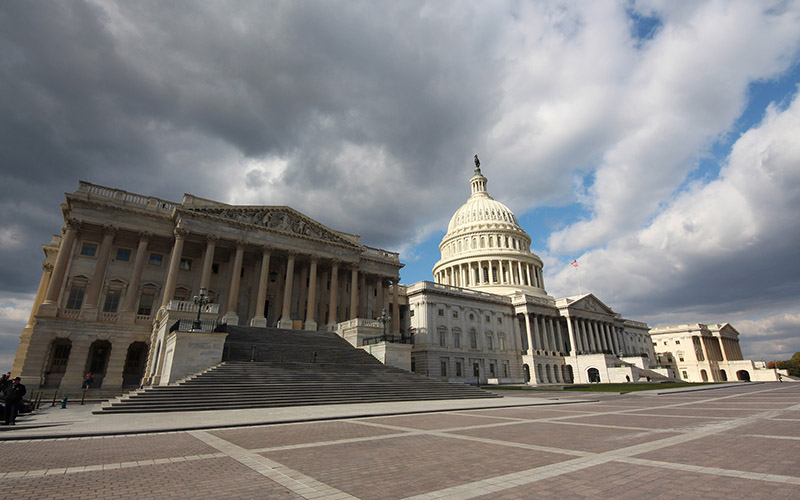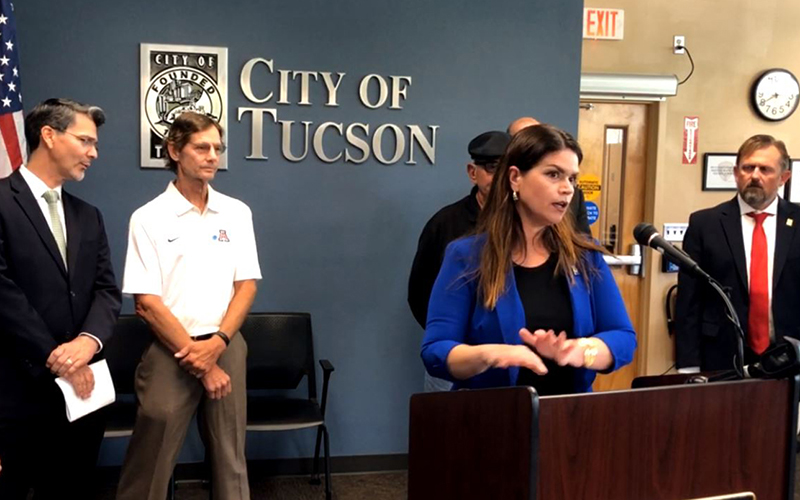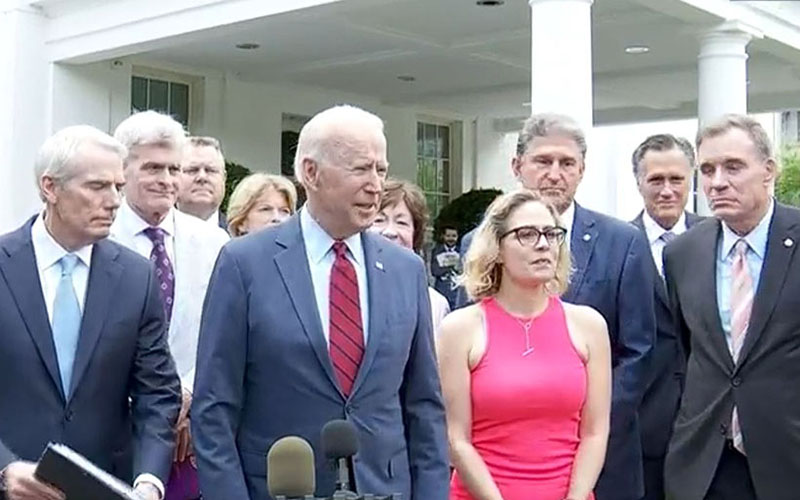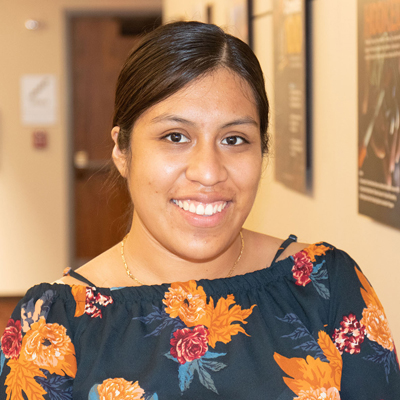WASHINGTON – Arizona lawmakers joined hundreds on the White House lawn Monday as President Joe Biden signed a $1.2 trillion infrastructure bill that includes billions of dollars for road, transit, environmental cleanup and other projects in the state.
Biden hailed the bill as “consequential,” even though the final version is far less than the $2.2 trillion he originally requested in March.
“Too often in Washington, the reason we don’t get things done is because we insist on getting everything we want – everything,” Biden said. “With this law, we focused on getting things done.”
That theme was echoed by Sen. Kyrsten Sinema, D-Arizona, who had a featured role at Monday’s signing event as one of the senators who crafted the bipartisan deal that let the infrastructure bill pass the Senate with 19 Republican votes.
“This is what it looks like when elected leaders set aside differences, shut out the noise and focus on delivering results on the issues that matter most to everyday Americans,” Sinema said,
Sinema, who has come under intense fire from Democrats for reservations on Biden’s Build Back Better plan to expand spending on social programs, said the infrastructure bill would create “millions of jobs” without raising taxes.
The Infrastructure Investment and Jobs Act signed Monday will spend billions on traditional infrastructure projects like roads and bridges, ports and airports, water system improvements and public transit, among others. But it also includes money to improve broadband access, expand charging networks for electric vehicles and fight climate change.
Arizona would get at least $7.3 billion in funding, according to the White House. The bulk would come in the form of $5 billion guaranteed for roads and another $225 million for bridges, with the possibility of the state getting a share of another $12.5 billion that has been set aside for bridges nationwide.
The state would get at least $884 million over five years for public transit projects, $619 million for water infrastructure, $348 million for airport improvements and $100 million for expanding broadband. The bill also includes $38 million to fight wildfires in the state and nearly $17 million to defend against cyberattacks.
“From better roads, to stronger electric grids, to cleaner water, to faster internet in more places, our plan will create millions of jobs and make our country stronger, safer, and more globally competitive without raising taxes on everyday Americans,” Sinema said.
In addition to the wildfire and drought funding that will benefit states like Arizona, Sinema pointed to money that has been set aside specifically for tribal communities across the nation.
“Our bill makes significant investments in tribal communities’ infrastructure, including all necessary funding to complete authorized Indian water rights settlements,” she said.
Tucson Mayor Regina Romero, who was on hand for the signing, said the bill would fund road and bridge repairs, electric-vehicle charging stations and the establishment of passenger-rail service to Phoenix. It also invests about $72 million annually for 5 years to clean up PFAS – the per- and polyfluoroalkyl substances that have leached into the groundwater near Davis-Monthan Air Force Base and Tucson International Airport.
PFAS is a class of long-lasting chemicals used in a wide range of products, including fire-suppression foam on military bases. But the Environmental Protection Agency has determined that the chemical could pose health hazards, including developmental problems, liver issues and cancer above certain levels.
Tucson suspended operations at one of the city’s water plants in June, because PFAS was believed to be heading in the direction of the plant’s underground water source.
“One of the most important pockets of money that is included in the bipartisan infrastructure bill is PFAS remediation,” Romero said.
“I think it’s an incredible start to the continued investment in remediating our water in this country, specifically in Tucson where we are really looking at dangerous levels of PFAS in our system,” she added.
She was one of an estimated 800 guests on the White House lawn, including Arizona Democratic Reps. Ruben Gallego of Phoenix and Tom O’Halleran of Sedona, Sen. Mark Kelly, D-Ariz., Navajo Nation President Jonathan Nez and Gila River Indian Community Gov. Stephen Roe Lewis, among others.
“This legislation will create jobs that will support families and revitalize our crumbling infrastructure with made-in-America work.” O’Halleran said in a prepared statement. “Pipefitters, auto workers, clean energy construction, tradesmen, and specialized labor and small business involvement will all work in tandem to uplift rural economies across our country.”
The crowd was overwhelmingly Democratic, but also included a number of Republican senators, governors and House members, a fact noted by Biden.
“The bill I’m about to sign into law is proof that despite the cynics, Democrats and Republicans can come together and deliver results,” he said. “We can do this. We can deliver real results for real people.”
But some of the biggest rounds of applause came after House Speaker Nancy Pelosi and Senate Majority Leader Chuck Schumer mentioned the Biden administration’s $1.9 trillion Build Back Better plan. That bill has stalled in the Senate, where not a single Republican has supported it.
Still, Romero was upbeat, calling it a “historic occasion, not just for the presidency of President Biden, but also for our nation.”
She said the crowd, from local elected officials to members of Congress, was an important part of passing the bill.
“In order to pass such a historic bill, every level of government needs to participate,” Romero said. “Every single level of government made a difference.”





